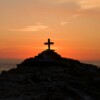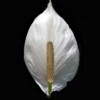Whatever rises must fall. Birds return to the forests of their birth, and salmon to the place of their spawning. Elephants (mythically) and humans, too, try to go home to die. Much of Creation is departure and return – but return in a different light. It is return, perhaps, with new maturity. Or return with young pride chastened and old lusts dimmed. Or return with small gifts and acknowledgments to the cracking soil that birthed us – soil that will one day take us back to itself.
Augustine of Hippo, in his Confessions, told a story of return to his mother’s faith – a mother whom he’d fled years before. C.S. Lewis traced a similar return in his Pilgrim’s Regress, where his young hero rejects the Church and discovers it later in transfiguring light. In an accelerated way, the Apostle Paul must have been surprised to find in Christ Crucified – whose followers he had persecuted – a return to the faith of his youth, under a different sign.
The little devils who whisper on our shoulders tell us our present is not enough. They teach us to resent our spouses, to be exasperated with our children, to dismiss our parents with their antiquated notions. They teach us to despise our jobs, which never quite fulfill us, and to complain about friends who never quite understand us. They teach us to sneer at church leaders who over-generalize with trite pieties, and to despise government leaders who are “out of touch.” They tell us that if only, if only, we had our own way, everything would be better. If only the world would listen to us, and deign to read our minds and hearts. If only everything weren’t so broken, so hopeless, full of bad faith and incompetence. If only people would be better, according to our judgment. If only everyone would listen to me.
And so we go out. We go out from our nests and our rivers; we go out from our home soil. If we stay, or if we don’t go far, we go out in our minds. Maybe we read novels or magazines or social media posts that place us, in our imaginations, among better people, more sophisticated people – people who understand. Maybe we take refuge in the grandeur of history, imagining our forebears were our true kin. Maybe we project ourselves into far-off cultures, with exoticizing zeal, imagining kindred spirits under pergolas or palms.
The little devils rejoice at these departures, for they distract us from the true work at hand. Christ famously told us to attend the plank in our own eyes. This is because our quotidian struggles (so insulting to our dignity) build fences of blindness – fences of many planks. And they cannot be escaped, for they are inside us, hemming our spirits all around. We cannot see the forest for these stripped and barren trees, blocking our sight so that we long to flee. Yet it is only through them that we can progress. Our first job is to clear the ground around us, with the little light we have, so that we can at length see further under greater Lights.
Academia dangles promises that tempt us always to depart from immediate circumstances. And it does this with rules whose very intricacy seem to guarantee success. “Master the rules, and you have mastered your fate,” it whispers. “It’s true, only the brightest win through, but you are bright and you will win.” So those of us with a certain disposition will try this path, chasing will o’ the wisps, crashing like waves against cliffs. We are good students, reaching for the brass ring, and there is always a new one – bigger and brighter – to grasp. (At the end, it seems, there are rings of gold!) Earn high marks, then prestigious awards. Publish more. Score invitations to pontificate. Groom yourself to appear refined – oh, so subtly refined, with the large glasses and crumpled clothes of the sublimely indifferent. “Grasp for an ideal of Wisdom made flesh! When you achieve it, you will be finished! When you achieve it, you will be free!”
But I am, I know, just a gangly child, staggering on a new bicycle, on a bumpy sidewalk, on a hot August morning. In God’s eyes, I am perhaps not even that – I am a toddler lunging for shining toys and crying over spilt milk. I have tried to go forth, but all has been return, and an unveiling of little vanities. Better than I, always, was that old woman croaking hymns and paying embarrassing compliments in the back of my childhood church.
At the bottom of the famous Ghent Altarpiece, by the brothers Van Eyck, is a field greener than any you have ever seen. In its center there is an altar, and on the altar a Living Lamb, of pure white, with golden rays around His head. On either side, martyrs rush across verdant grass to see this wonderful sight, and be truly seen, by Him, at last. There, alone, is the grass greener.
So let me toil in this place I’ve landed, in gratitude, body and spirit. And let me wait, in peace and humility, until that final, glorious Return.
























This is so where I was at the end of spring semester. I’ve spent the summer studying Ecclesiastes which I have found helpful on these things. At the risk of going down a rabbit trail, the 3 men, on the most distant left, dressed as the pope, are a portrayal of the 3 actual simultaneous popes that excommunicated each other, who here in the presence of the Lamb are at peace.
Thank you for the elegant reminder that in the end what counts more than our resume, tenure, or student evals is truly being seen by Him.